
Alfred Gerald Caplin, better known as Al Capp, was an American cartoonist and humorist best known for the satirical comic strip Li'l Abner, which he created in 1934 and continued writing and drawing until 1977. He also wrote the comic strips Abbie an' Slats and Long Sam (1954). He won the National Cartoonists Society's Reuben Award in 1947 for Cartoonist of the Year, and their 1979 Elzie Segar Award, posthumously for his "unique and outstanding contribution to the profession of cartooning".

Li'l Abner was a satirical American comic strip that appeared in multiple newspapers in the United States, Canada, and Europe. It featured a fictional clan of hillbillies living in the impoverished fictional mountain village of Dogpatch, USA. Written and illustrated by Al Capp (1909–1979), the strip ran for 43 years, from August 13, 1934, through November 13, 1977. The Sunday page debuted on February 24, 1935, six months after the daily. It was originally distributed by United Feature Syndicate and later by the Chicago Tribune New York News Syndicate.

The shmoo is a fictional cartoon creature created by Al Capp (1909–1979); the character first appeared in the comic strip Li'l Abner on August 31, 1948. The character created a fad that lasted into the 1950s, including merchandise, songs, fan clubs, and appearances on magazine covers. The parable of the shmoo has been interpreted in many different ways, both at the time and in later analysis.
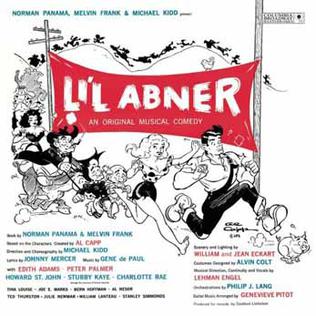
Li'l Abner is a 1956 musical with a book by Norman Panama and Melvin Frank, music by Gene De Paul, and lyrics by Johnny Mercer. Based on the comic strip Li'l Abner by Al Capp, the show is, on the surface, a broad spoof of hillbillies, but it is also a pointed satire on other topics, ranging from American politics and incompetence in the United States federal government to propriety and gender roles.
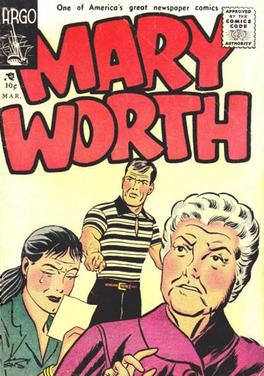
Mary Worth is an American newspaper comic strip that has had an eight-decade run from 1938. Distributed by King Features Syndicate, this soap opera-style strip influenced several that followed. It was created by writer Allen Saunders and artist Dale Connor, and initially appeared under the pseudonym "Dale Allen". Ken Ernst succeeded Connor as artist in 1942.

Fearless Fosdick is a long-running parody of Chester Gould's Dick Tracy. It appeared intermittently as a strip-within-a-strip, in Al Capp's satirical hillbilly comic strip, Li'l Abner (1934–1977).
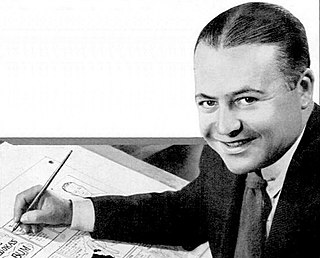
Hammond Edward "Ham" Fisher was an American comic strip writer and cartoonist. He is best known for his long, popular run on Joe Palooka, which was launched in 1930 and ranked as one of the top five newspaper comics strips for several years.
Dogpatch was the fictional setting of cartoonist Al Capp's classic comic strip Li'l Abner (1934–1977).
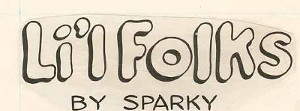
Li'l Folks, the first comic strip by Peanuts creator Charles M. Schulz, was a weekly panel that appeared mainly in Schulz's hometown paper, the St. Paul Pioneer Press, from June 22, 1947, to January 22, 1950. As Schulz's first regular cartoon, Li'l Folks can be regarded as an embryonic version of Peanuts, centered around children saying things beyond their years. Unlike Peanuts, Li'l Folks did not feature any recurring characters, though several themes were carried over to the later strip, including: Beethoven's music ; dogs resembling Snoopy that appeared in most strips; and the name Charlie Brown.

Eugene Leslie Ahern was a cartoonist best known for his bombastic Major Hoople, a pompous character who appeared in the long-run syndicated gag panel Our Boarding House. Many of Ahern's comic strips took a surreal or screwball approach, notably The Squirrel Cage with its nonsensical catchphrase "Nov shmoz ka pop?"
United Feature Syndicate, Inc. (UFS) is a large American editorial column and comic strip newspaper syndication service based in the United States and established in 1919. Originally part of E. W. Scripps Company, it was part of United Media from 1978 to 2011, and is now a division of Andrews McMeel Syndication. United Features has syndicated many notable comic strips, including Peanuts, Garfield, Li'l Abner, Dilbert, Monty, Nancy, Over the Hedge, and Marmaduke.

Abbie an' Slats is an American comic strip which ran from July 12, 1937, to January 30, 1971, initially written by Al Capp and drawn by Raeburn Van Buren. It was distributed by United Feature Syndicate.

Lee Elias was a British-American comics artist. He was best known for his work on the Black Cat comic book published by Harvey Comics in the 1940s.
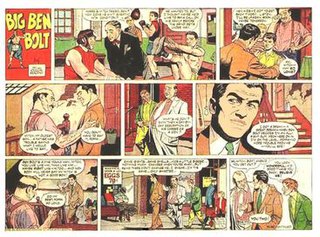
Big Ben Bolt is a comic strip that was syndicated from February 20, 1950 to April 15, 1978. It was drawn by John Cullen Murphy, written by Elliot Caplin, and distributed by King Features Syndicate. The strip followed the adventures of boxer and journalist Ben Bolt.

Li'l Abner is a 1940 film based on the comic strip Li'l Abner created by Al Capp. The three most recognizable names associated with the film are Buster Keaton as Lonesome Polecat, Jeff York as Li'l Abner, and Milton Berle, who co-wrote the title song.
Toby Press was an American comic-book company that published from 1949 to 1955. Founded by Elliott Caplin, brother of cartoonist Al Capp and himself an established comic strip writer, the company published reprints of Capp's Li'l Abner strip; licensed-character comics starring such film and animated cartoon properties as John Wayne and Felix the Cat; and original conceptions, including romance, war, Western, and adventure comics. Some of its comics were published under the imprint Minoan. Some covers bore the logo ANC, standing for American News Company, at the time the country's largest newsstand distributor.

Room and Board is the title of two American comic strips. The first, created by Sals Bostwick, debuted on May 21, 1928. He drew it until his death in 1930, after which it was continued by cartoonists Brandon Walsh, Benbee, Darrell McClure, Dow Walling and Herman Thomas before coming to an end in 1932.
Robert Bartow Lubbers was an American comic strip and comic book artist best known for his work on such strips as Tarzan, Li'l Abner and Long Sam.

Alfred Earl Hayward, was a 20th century American comic strip artist. He was known professionally as A. E. Hayward for his comics work although he used his full name for his fine arts work.
Li'l Abner: The Complete Dailies & Color Sundays, also known as The Complete Li'l Abner, is a series collecting the American comic strip Li'l Abner written and drawn by Al Capp, originally distributed by the syndicate United Feature Syndicate and later by Chicago Tribune New York News Syndicate, in total during 43 years before the strip ended. The strip debuted in August 1934 and at its peak, it had an estimated readership of over 60 million people regularly. The collection is published by The Library of American Comics.















